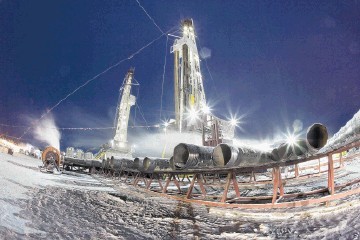
The collapse in capital investment in the Canadian oil industry should press Prime Minister Justin Trudeau’s government to push the button on new oil pipelines and liquefied natural gas developments for an industry struggling with the commodity price slump, said Tim McMillan, CAPP’s chief executive.
Canada’s oil and gas industry is on track to see its biggest two-year capital spending decline in its seven-decade history, according to the Canadian Association of Petroleum Producers.
McMillan urged the Government – and Canadians – to reduce the amount of oil imports when the countries own industry is hurting.
Take Energy Voice’s Sub $50 survey here.
Speaking to Energy Voice, McMillan said: “We have to be able to put ourselves on a level playing field to get to market. 80% of oil in Quebec is imported from countries such as Venezuela, Angola and Nigeria. We would want Canadians to use Canada’s oil. That’s a win-win for the country.”
Overseas markets such as India and China are key to a successful future, but we need the pipelines and LNG faclities in place to be able to do that.”
“We are not going to get the investment we need if we do not have the infrastructure to compete with other oil producing countries head to head,” said McMillan
Companies are expected to invest just $31 billion in 2016, a 62% drop from the 2014 record of $81 billion.
As a result, the number of wells drilled in Western Canada is forecast to decline to 3,500 wells in 2016, a 66% drop from the 10,400 wells drilled in 2014.
It’s the biggest drop since records began in 1947 — the year of Alberta’s first major oil discovery.
The US benchmark oil price was above US$100 a barrel in mid-2014. Now, it’s at about US$37.
McMillan said: “This is affecting the entire Canadian economy. The Government wants to see Canada grow and prosper and oil and gas is crucial to that prosperity.”
“It is having a very big effect on the oil producing regions of Alberta, Saskatchewan – people are hurting.”
CAPP estimates 110,000 direct and indirect jobs have been lost in the downturn, which began in late 2014 and has continued to deepen since.
Alberta relies on fossil fuel royalty revenue to pay for hospitals, schools and roads and is facing a budget deficit as a result of decling oil revenue.
Register for Energy Voice’s OTC here.
Take Energy Voice’s Sub $50 survey here.